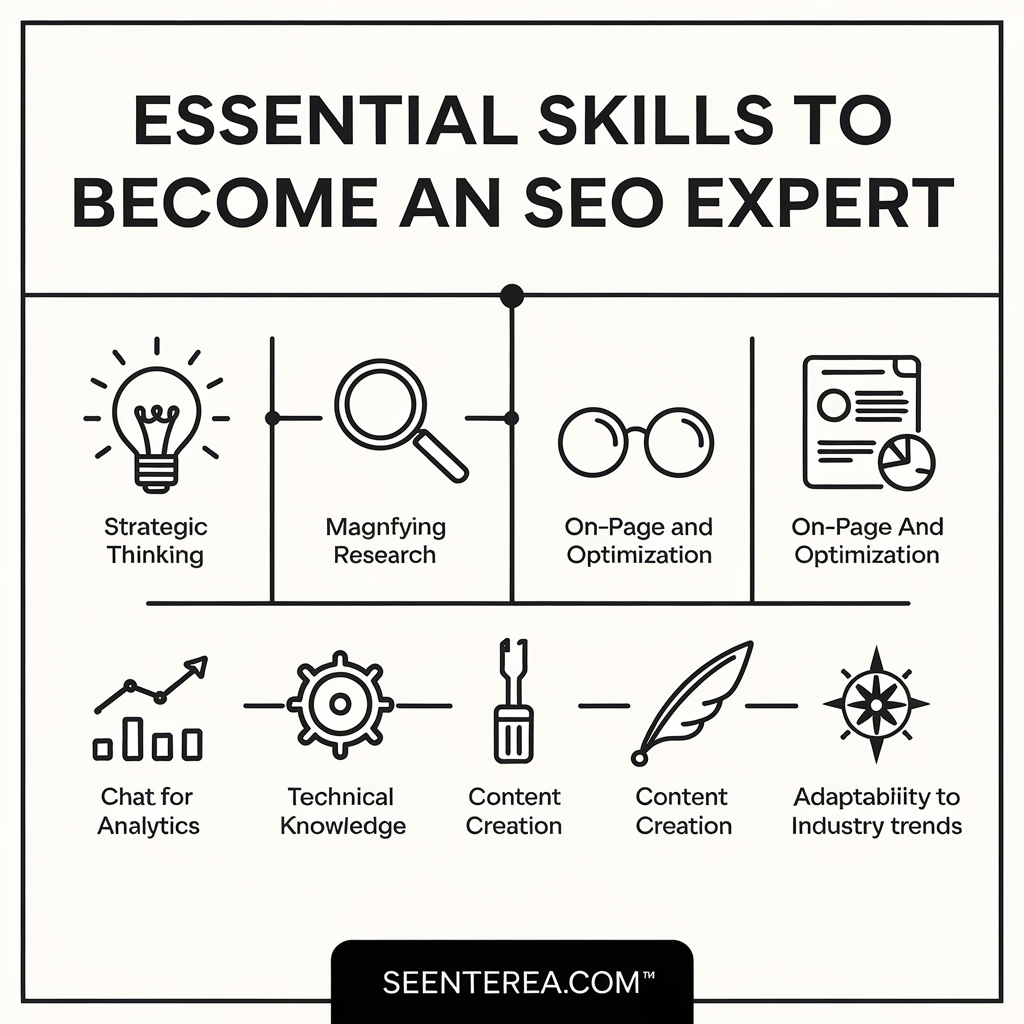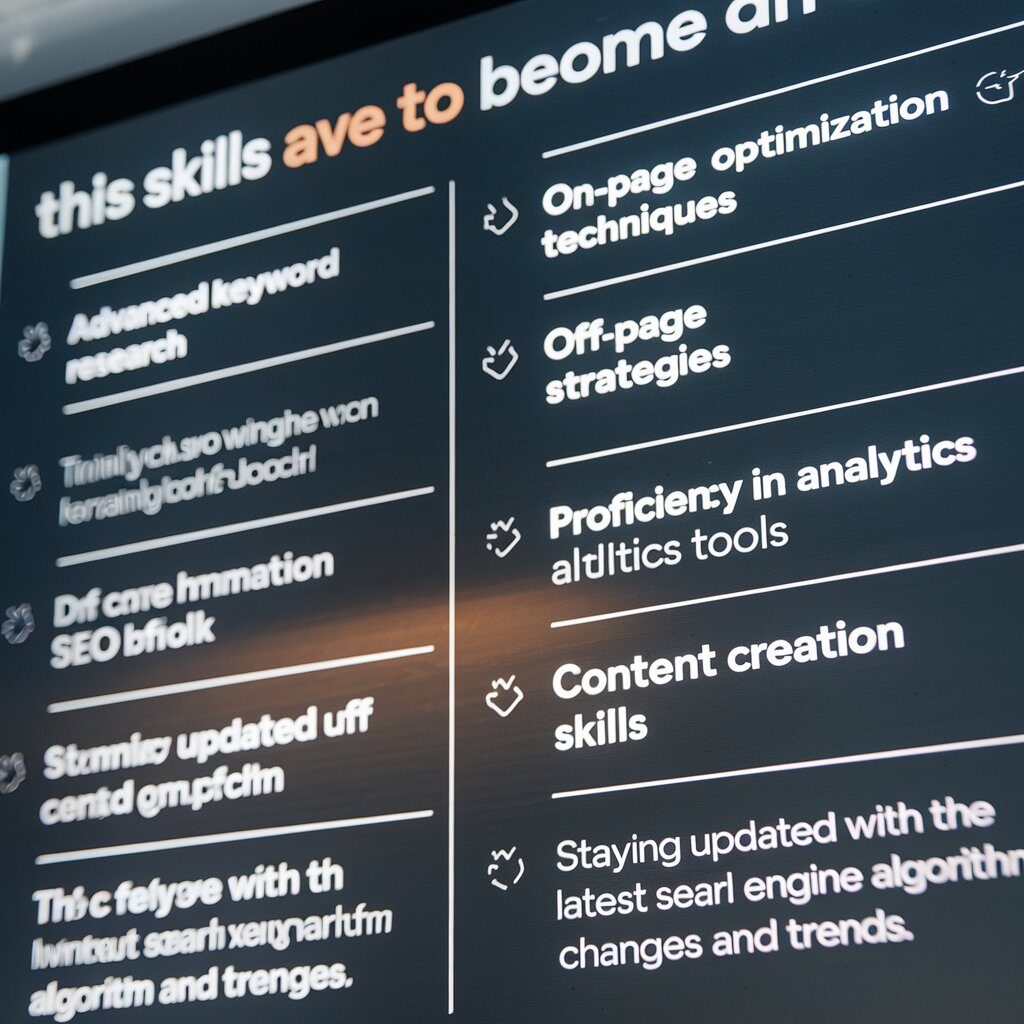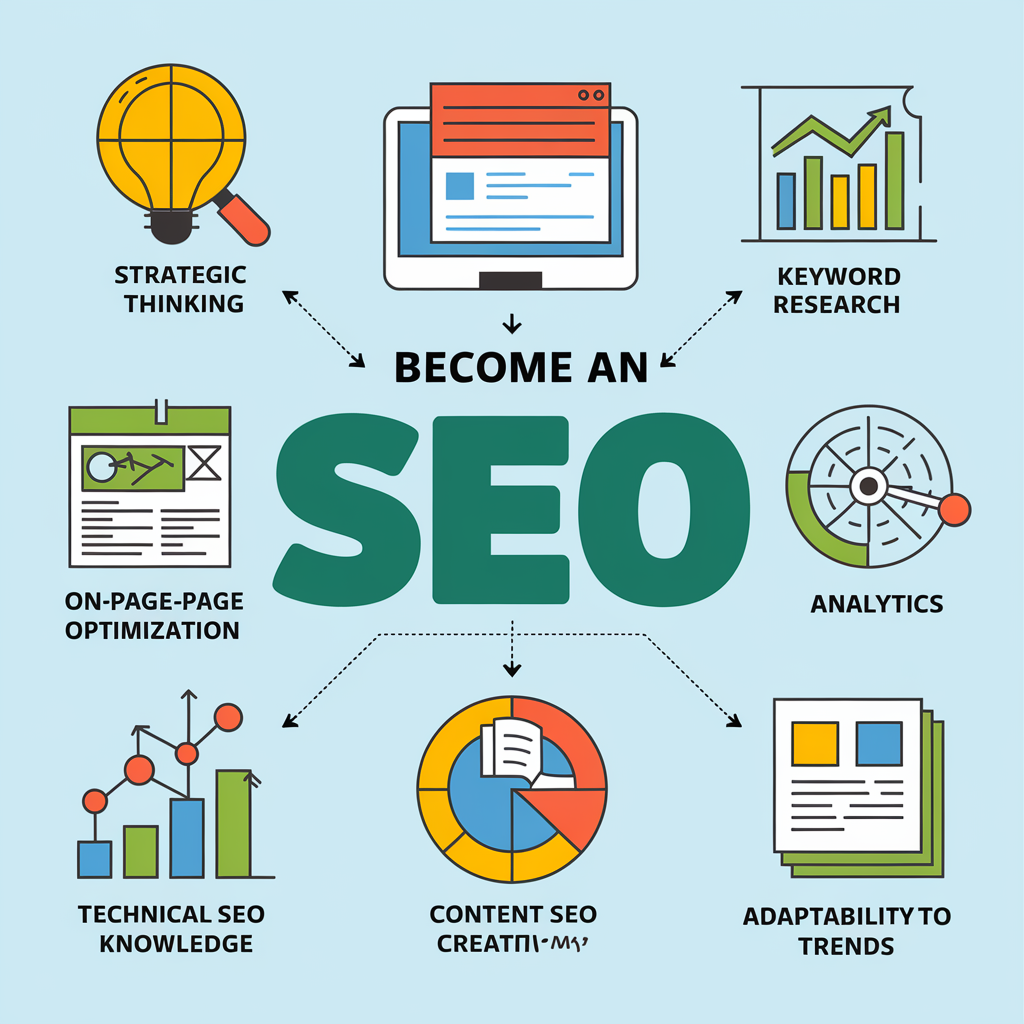What skills are necessary to become an SEO expert?
SEO is a vital skill. It’s the key to visibility in the vast online world. But what does it take to become an SEO expert? This article aims to answer that question. We’ll delve into the essential skills needed to master SEO. From understanding the fundamentals to mastering advanced techniques, we’ve got you covered.

SEO is not just about keywords. It’s a complex field that requires a diverse skill set. You need to understand how search engines work. You need to know how to optimize content and code. Also, you need to be able to analyze data and draw insights. You need to stay updated with the ever-changing algorithms.
But that’s not all. SEO is also about understanding your audience. It’s about delivering content that not only ranks but also resonates. Also, it’s about integrating SEO with other aspects of digital marketing. It’s about aligning your SEO strategy with your business goals.

In this comprehensive guide, we’ll explore all these aspects. We’ll provide you with a roadmap to becoming an SEO expert. Whether you’re a beginner or an experienced marketer looking to upskill, this guide is for you. Let’s dive in.
Understanding SEO Fundamentals
Before you can master SEO, you need to understand its fundamentals. SEO, or Search Engine Optimization, is the practice of optimizing websites to rank higher in search engine results.

The goal is to increase visibility and attract organic traffic. But how does one achieve this? Here are the key fundamentals of SEO:
- Understanding how search engines work
- Knowing the importance of E-A-T (Expertise, Authoritativeness, Trustworthiness)
- Mastering on-page and off-page SEO
- Conducting keyword research
- Creating SEO-friendly content
- Understanding technical SEO
- Using SEO tools effectively
- Analyzing and measuring SEO performance
Let’s start with the first point: understanding how search engines work.
How Search Engines Work
Search engines like Google use complex algorithms to deliver search results. These algorithms crawl and index web pages. They then rank these pages based on relevance and quality. But what factors do these algorithms consider?
There are hundreds of ranking factors. These include the relevance of your content, the number of backlinks to your site, and the user experience your site provides. Understanding these factors is crucial. It allows you to optimize your site in a way that aligns with what search engines value. But there’s another important concept to understand: E-A-T.
The Importance of E-E-A-T in SEO
E-E-A-T stands for Expertise, Exposure, Authoritativeness, and Trustworthiness. It’s a concept introduced by Google. It’s used to assess the quality of web content. Expertise refers to the depth of knowledge displayed in your content. Authoritativeness is about the credibility and recognition of your site. Trustworthiness relates to the security and transparency of your site.
E-A-T is especially important for YMYL (Your Money or Your Life) sites. These are sites that can potentially impact a person’s health, finances, or happiness. But regardless of your site’s nature, E-A-T is a crucial factor. It can significantly impact your site’s ranking. In the next sections, we’ll delve deeper into how to optimize for these factors.
Mastering On-Page SEO
On-page SEO refers to the optimization of individual web pages. This includes both the content and the HTML source code.

The goal is to make each page as relevant and valuable as possible. This increases its chances of ranking high in search engine results. On-page SEO involves several elements. These include:
- Meta tags
- Headers
- URL structure
- Keyword usage
- Image optimization
- Internal linking
Let’s start with the first three: meta tags, headers, and URL structure.
Meta Tags, Headers, and URL Structure
Meta tags are snippets of text that describe a page’s content. They don’t appear on the page itself. Instead, they’re embedded in the page’s HTML code. Search engines use meta tags to understand what a page is about. This helps them determine when to show the page in search results. Headers, on the other hand, are visible on the page. They’re used to structure your content and make it easier to read.
Headers also help search engines understand your content. They give clues about the topics covered on the page. Then there’s the URL structure. A good URL is short, descriptive, and includes keywords. This makes it easier for both users and search engines to understand what the page is about.
Creating SEO-Friendly Content
Creating SEO-friendly content is a crucial part of on-page SEO. But what does this mean? First, your content should be high-quality and valuable. It should provide answers to the questions your audience is asking. Second, it should be easy to read and understand. This means using clear language, short sentences, and plenty of white space. Third, it should include relevant keywords.
These are the terms your audience uses when searching for your content. But remember: keyword usage should be natural and balanced. Overuse of keywords, or “keyword stuffing”, can harm your SEO. Finally, your content should be engaging. It should encourage users to spend time on your page and interact with your content. This sends positive signals to search engines and can boost your ranking.
Keyword Research Proficiency
Keyword research is a fundamental SEO skill. It involves identifying the words and phrases that people use in search engines. These are the terms that your content should target. Why? Because when your content matches the terms people are searching for, it’s more likely to be found.
But keyword research isn’t just about finding the most popular terms. It’s also about understanding the intent behind those terms. This helps you create content that not only attracts visitors but also meets their needs.
Identifying High-Value Keywords
High-value keywords are those that can bring the most benefit to your website. But how do you identify them? First, look for keywords that are relevant to your content. These are the terms that your target audience is likely to use when searching for your products or services. Second, consider the search volume. This is the number of times a keyword is searched for in a given period.
High search volume means more potential traffic. But it can also mean more competition. Finally, consider the keyword’s difficulty. This is a measure of how hard it is to rank for that keyword. A high-value keyword is one that is relevant, has a good search volume, and a difficulty level that matches your website’s ability to compete.
Tools for Effective Keyword Research
There are many tools available to help with keyword research.

Google Keyword Planner is a popular choice. It provides data on search volume and competition for different keywords. Another useful tool is SEMrush. It offers detailed keyword analytics and helps identify opportunities for organic traffic growth. Ahrefs is also a powerful tool. It provides keyword suggestions, search volume data, and keyword difficulty scores.
These tools can help you identify high-value keywords and understand the search landscape. But remember: tools are just aids. The real skill lies in interpreting the data and applying it to your SEO strategy.
Technical SEO Expertise
Technical SEO is a critical skill for any SEO expert. It involves optimizing your website’s technical aspects to improve its visibility in search engines. This includes aspects like site speed, mobile-friendliness, and site architecture. Technical SEO also involves ensuring that search engines can easily crawl and index your website.
This requires a good understanding of robots.txt files, XML sitemaps, and website structure. Technical SEO can be complex. But it’s essential for ensuring that your website meets search engine guidelines. It also plays a significant role in providing a good user experience, which can indirectly impact your SEO performance. So, if you want to become an SEO expert, mastering technical SEO is a must.
Site Speed Optimization and Mobile-Friendliness
Site speed is a crucial factor in both user experience and SEO. A slow-loading website can frustrate users and lead them to leave your site. This can increase your bounce rate, which can negatively impact your SEO. So, optimizing your site speed is essential. This can involve techniques like compressing images, minifying code, and leveraging browser caching.
Mobile-friendliness is another critical factor. More people are using mobile devices to access the internet than ever before. So, search engines like Google prioritize websites that are mobile-friendly. This means your website needs to be responsive. It should look and function well on all devices, not just desktop computers.
Conducting SEO Audits
An SEO audit is a process of analyzing your website to identify areas for improvement. It involves checking your website’s technical health, on-page and off-page SEO, and user experience.

An SEO audit can help you understand why your website is not ranking well. It can also provide insights into how you can improve your SEO performance. There are many tools available to help with SEO audits, like SEMrush and Ahrefs. But conducting an effective SEO audit requires more than just using a tool. It requires a deep understanding of SEO best practices and the ability to analyze and interpret data. So, conducting SEO audits is another essential skill for an SEO expert.
Proficiency with SEO Tools
SEO tools are essential for any SEO expert. They can help you with various tasks, from keyword research to competitor analysis. Some of the most popular SEO tools include Google Analytics, Ahrefs, SEMrush, and Moz. Each tool has its strengths and can provide valuable insights to inform your SEO strategy.
For example, Google Analytics can provide data on your website’s traffic, user behavior, and conversion rates. Ahrefs and SEMrush, on the other hand, are great for keyword research, backlink analysis, and competitor research. So, being proficient with these tools is a must for any SEO expert.
Google Analytics and Other Essential Tools
Google Analytics is a powerful tool for any SEO expert. It provides insights into how users find and interact with your website.

You can see which pages are most popular, where your traffic is coming from, and how users behave on your site. This data can help you make informed decisions about your SEO strategy. Other essential tools include Ahrefs for backlink analysis, SEMrush for keyword research, and Moz for SEO metrics. Each tool offers unique features and benefits, so it’s important to familiarize yourself with each one.
Leveraging Tools for SEO Checklist and Audits
SEO tools are also essential for conducting SEO audits and managing your SEO checklist. They can help you identify issues with your website that could be hurting your SEO performance. For example, tools like Screaming Frog can crawl your website to identify broken links, duplicate content, and other technical issues.
Other tools, like SEMrush, can provide a comprehensive SEO audit that covers on-page and off-page SEO, technical SEO, and user experience. These tools can save you a lot of time and effort. But remember, while these tools can provide valuable insights, they are just tools. The real skill lies in how you interpret and act on the data they provide.
Link Building Strategies
Link building is a crucial part of SEO. It involves getting other websites to link to your website. These links, known as backlinks, can significantly improve your website’s visibility in search engine results. But not all backlinks are created equal. The quality of the backlinks is just as important, if not more so, than the quantity. Backlinks from high-authority websites are more valuable than those from low-authority websites. So, a successful link building strategy focuses on acquiring high-quality backlinks.
Understanding Backlinks and Their Importance
Backlinks are links from other websites that point to your website. They are like votes of confidence in your content.

When a website links to your content, it signals to search engines that your content is valuable and trustworthy. This can improve your website’s ranking in search engine results. But remember, the quality of the backlinks matters. Backlinks from high-authority websites carry more weight than those from low-authority websites. So, understanding backlinks and their importance is key to a successful SEO strategy.
Effective Link Building Techniques
There are many techniques for building high-quality backlinks. One of the most effective is creating high-quality, valuable content that others want to link to. Another technique is guest posting, where you write a post for another website and include a link back to your website You can also use social media to promote your content and attract backlinks. But remember, link building is not about quantity. It’s about quality. So, focus on building high-quality backlinks that will improve your website’s authority and visibility in search engine results.
Local and International SEO Tactics
SEO is not a one-size-fits-all strategy. It needs to be tailored to the specific audience you’re trying to reach. This is where local and international SEO come into play. Local SEO focuses on optimizing your website for a specific geographic area.
On the other hand, international SEO involves optimizing your website for different countries and languages. Both are crucial for businesses that operate in multiple locations or serve a global audience. Let’s delve deeper into these two aspects of SEO.
Optimizing for Specific Geographic Areas
Local SEO is all about reaching customers in your local area. It involves optimizing your website for local search terms. For example, if you run a bakery in New York, you might optimize for search terms like “New York bakery” or “best bakery in New York”. Local SEO also involves claiming and optimizing your business listing on Google My Business. This can help your business appear in local search results and Google Maps. So, if you’re a local business, local SEO is a must.
International SEO Considerations
International SEO is a bit more complex. It involves optimizing your website for different countries and languages.

This might involve creating different versions of your website for different countries. Or it might involve translating your content into different languages. You also need to consider cultural differences and local search habits. So, if you’re targeting a global audience, international SEO is crucial.
Analyzing and Measuring SEO Performance
SEO is not a set-and-forget strategy. It requires constant monitoring and adjustment. This is where SEO performance analysis comes in. It involves tracking key performance metrics and using this data to inform your SEO strategy. Let’s take a closer look at how this works.
Tracking Performance Metrics
There are many metrics you can track to measure your SEO performance. These include organic traffic, bounce rate, and conversion rate. You can also track keyword rankings to see how well your website is ranking for specific search terms. These metrics can give you a clear picture of how well your SEO efforts are working. But tracking metrics is only half the battle. You also need to use this data to inform your SEO strategy.
Using Data to Inform SEO Strategy
Data is a powerful tool in SEO. It can help you identify what’s working and what’s not.

For example, if you notice that a particular page is not getting much organic traffic, you might decide to optimize it. Or if you see that a certain keyword is driving a lot of traffic, you might decide to create more content around that keyword. In other words, data can help you make informed decisions about your SEO strategy. So, make sure to track your performance metrics and use this data to guide your SEO efforts.
The Role of User Experience (UX) in SEO
User experience (UX) plays a crucial role in SEO. It’s not just about getting people to your site. It’s also about providing them with a positive experience once they’re there. This includes things like site speed, mobile-friendliness, and easy navigation. If your site provides a good user experience, people are more likely to stay longer and engage with your content.
This can lead to higher rankings in search engine results pages (SERPs). On the other hand, if your site provides a poor user experience, people are likely to leave quickly. This can increase your bounce rate and negatively impact your SEO. So, it’s important to always keep user experience in mind when optimizing your site for SEO. Remember, a happy user is a happy search engine.
Content Marketing and SEO Integration
Content marketing and SEO are two sides of the same coin. They work best when they’re integrated. A well-planned content marketing strategy can boost your SEO efforts. It can help you create high-quality, relevant content that attracts and engages your target audience. This can lead to increased traffic, improved brand visibility, and higher search engine rankings. On the other hand, a solid SEO strategy can enhance your content marketing efforts. It can help you identify the right keywords and topics to focus on in your content.
Developing a Content Strategy that Complements SEO
Developing a content strategy that complements SEO involves several steps. First, you need to understand your target audience. This includes their needs, interests, and search behavior. Next, you need to conduct keyword research. This can help you identify the topics and keywords that your audience is searching for. Then, you need to create high-quality, relevant content around these topics and keywords. Finally, you need to promote your content effectively to reach your target audience.
The Impact of Social Media and Influencer Marketing on SEO
Social media and influencer marketing can also have a significant impact on SEO. Social media can help you promote your content and reach a wider audience. This can lead to increased traffic, social signals, and backlinks, all of which can boost your SEO. Influencer marketing, on the other hand, can help you build high-quality backlinks.
This can improve your site’s authority and rankings in search engine results. Moreover, influencers can help you reach a larger and more engaged audience. This can lead to increased brand visibility and credibility, which can indirectly boost your SEO.
Staying Updated with SEO Trends and Algorithm Changes
SEO is a dynamic field. It’s constantly evolving due to changes in search engine algorithms and user behavior.

To stay competitive, you need to keep up with the latest SEO trends and algorithm changes. This can help you adapt your strategies and stay ahead of your competitors. Here are some ways to stay updated:
- Follow reputable SEO blogs and websites like Moz, Search Engine Journal, and SEO by the Sea.
- Attend SEO conferences and webinars.
- Join SEO communities and forums like SEO Chat and Webmaster World.
- Subscribe to SEO newsletters and podcasts.
- Follow SEO experts and influencers on social media.
By staying updated, you can ensure that your SEO strategies are always effective and up-to-date. This can help you achieve better results and maximize your SEO efforts.
Conclusion: Building a Career in SEO
Becoming an SEO expert is a journey. It requires a deep understanding of how search engines work and a keen eye for detail. You need to master a wide range of skills, from technical SEO to content marketing. But with dedication and continuous learning, you can build a successful career in SEO.
Remember, SEO is not just about getting higher rankings on search engines. It’s about providing a great user experience and delivering valuable content to your audience. So, keep learning, stay updated with the latest trends, and always strive for excellence. Your journey to becoming an SEO expert starts now. Good luck!
SEO Checklist Summary
In this comprehensive guide, we’ve covered a wide range of SEO skills necessary to become an SEO expert.

Let’s summarize these skills in a handy SEO checklist:
- Understanding SEO fundamentals and how search engines work.
- Mastering on-page SEO elements like meta tags, headers, and URL structure.
- Proficiency in keyword research and identifying high-value keywords.
- Writing SEO-friendly content that balances keyword optimization with readability.
- Familiarity with technical SEO, including site speed optimization and mobile-friendliness.
- Experience with link-building strategies and understanding the importance of backlinks.
- Ability to conduct SEO audits to identify issues and areas for improvement.
- Proficiency in using SEO tools such as Google Analytics, Ahrefs, SEMrush, Moz, and Screaming Frog.
- Understanding of local SEO tactics and international SEO considerations.
- Skills in creating and managing an SEO checklist to streamline optimization processes.
- Ability to track and analyze SEO performance metrics to measure success.
- Understanding of user experience (UX) principles and their impact on SEO.
- Knowledge of content marketing strategies and how they complement SEO efforts.
- Familiarity with the latest SEO trends and Google algorithm updates.
- Ability to adapt to changes in SEO best practices and update strategies accordingly.
This checklist is a roadmap to your journey in becoming an SEO expert. Remember, SEO is a dynamic field. It’s essential to stay updated with the latest trends and changes in the industry. Keep learning, keep experimenting, and keep growing. Your journey to becoming an SEO expert starts now. Good luck!


